Last updated on February 25th, 2026 at 07:35 am
Fair Value Gaps are inefficiencies in the market, occurring when the price moves in one direction, leaving behind a level with minimal trading activity. Trading Fair Value Gaps can offer new opportunities, especially when combined with order blocks and shifts in market structure. In trading, FVG stands for Fair Value Gap.
The Fair Value Gap trading strategy has gained popularity because of its high precision, simplicity, and frequent occurrence on charts, providing traders with more opportunities to execute trades. Additionally, it works across all timeframes and markets, including crypto, stocks, indices, and forex.
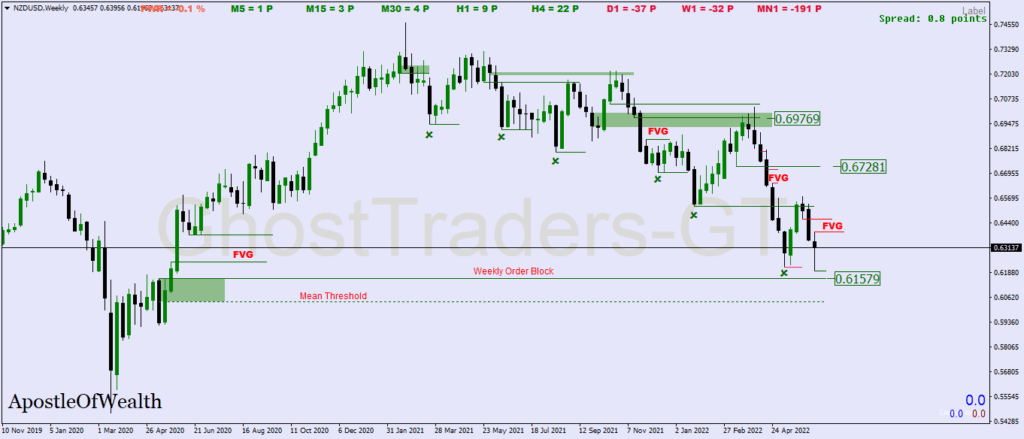
From The Chart Example, we can see how price declined significantly after closing our fair value gap. Based on the order flow being bearish, we can say this is a bearish fair value gap.
Price is most likely to reach out to areas where there are Fvg and Liquidity voids. The understanding of order flow trading should be coupled with fvg and liquidity void to select the best fair value gaps and liquidity voids.
Breakaway Fair Value Gap
A Breakaway Fair Value Gap is a significant price gap in the market that occurs when the price breaks out of a consolidation phase or trading range. This is a crucial concept used by experienced traders, such as GhostTraders, to gauge the strength of a trend and identify potential trading opportunities.
These gaps can manifest in both bullish and bearish markets and are characterized by a sudden surge in trading volume. This surge indicates a profound shift in market sentiment and direction.
In a Bullish Breakaway Gap, the price breaks above a resistance level, signaling that buyers have gained control of the market.
Conversely, in a Bearish Breakaway Gap, the price breaks below a support level, indicating that sellers have taken control.
Breakaway gaps often remain open for a crucial reason – they represent a rapid and substantial change in market sentiment and momentum. When a breakaway gap occurs, it signifies a shift in the balance between buyers and sellers. Consequently, there might be limited trading activity at the price level where the gap occurred, causing the gap to persist.
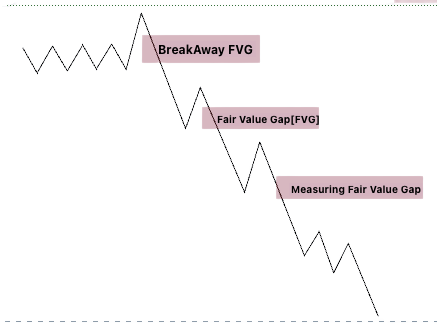
This lack of activity can persist until a substantial volume of buying or selling activity intervenes, either propelling the price higher or lower and causing the gap to close. The reason behind these gaps remaining open lies in the hesitancy of traders. Those who held positions at the gap level may be looking to sell to cut losses, while new traders may view it as too risky to buy at that level.
In essence, breakaway gaps are a powerful signal of changing market dynamics, and their persistence is a reflection of the uncertainty and caution among traders during these pivotal moments in the market.
Course Bundle
Up To 50% Off
Access all courses with a once-off purchase.
Benefits
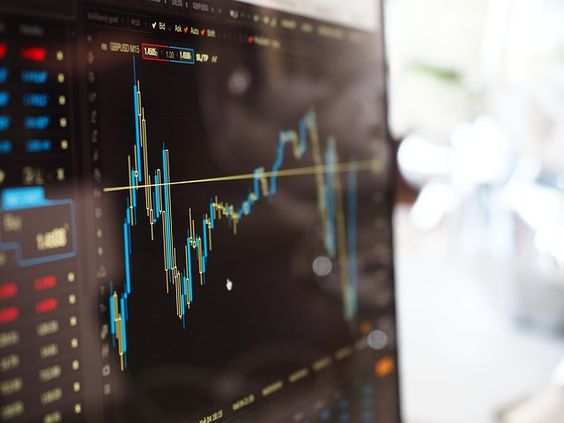
Measuring Fair Value Gap
In addition to Breakaway Gaps, there’s another crucial concept known as the “Measuring Fair Value Gap” in the world of Forex trading. It’s formed following a Fair Value Gap and plays a unique role in analyzing market dynamics.
The Measuring Fair Value Gap is characterized by its propensity to remain open. This persistence occurs because heavy institutional order flow often surrounds it, pushing prices consistently in one direction. As a result, the Measuring Gap is less likely to be closed. Its primary purpose is to act as an indicator of institutional order flow in a specific direction.
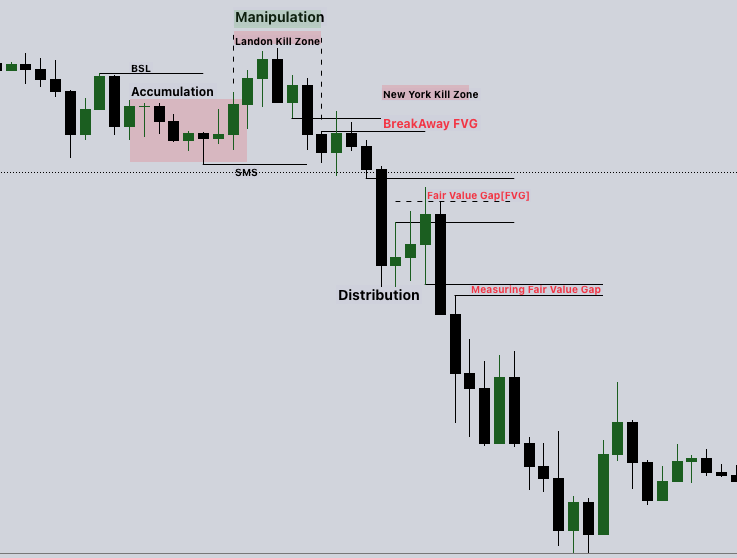
When a Bearish Measuring Fair Value Gap appears, it signals a dominant bearish order flow in the market. Conversely, a Bullish Measuring Gap indicates a prevailing bullish order flow.
The key reason behind the Measuring Gap’s tendency to remain open lies in the substantial institutional order flow that accompanies it. Institutions often execute large orders that drive the market decisively in a single direction, leaving little room for price retracement.
In summary, the Measuring Fair Value Gap serves as a valuable tool for traders to identify and interpret institutional order flow. Its persistence and direction provide valuable insights into the prevailing market sentiment, assisting traders in making informed decisions.
consequent encroachment forex
Consequent encroachment(CE) is when a fair value gap is filled by 50%; this is what is referred to as the mean threshold of fvg. Traders should keep in mind that price might not fill the fvg. therefore targeting the mean threshold is ideal not to miss trades.
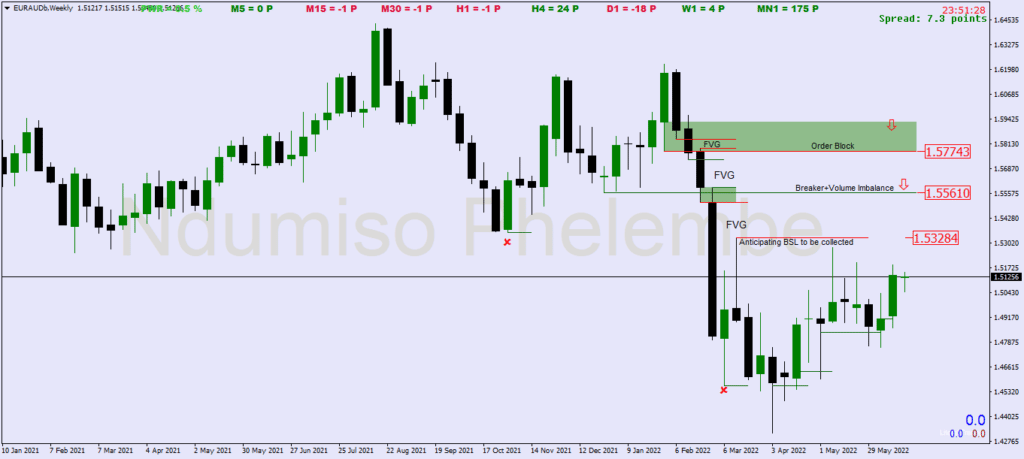
How to trade Liquidity voids with Fair value gaps
Liquidity voids occur when the price moves rapidly in one direction, forming large candlesticks with minimal trading activity. These voids represent a price imbalance that, over time, the market tends to revisit and fill. Liquidity voids are essential indicators of inefficiencies in price movement and can be used alongside fair value gaps and order blocks for stronger trading confluence. Traders typically engage with liquidity voids, fair value gaps, and order blocks after observing a shift in market structure, enhancing the accuracy of their trade setups.

The Best Fair Value Gap to Trade
To identify the ideal bearish fair value gap, check for the fvg at the premium level or above the discount of the defined range using Fibonacci Levels. Similarly, to identify a bullish fair value gap, look for fvg below the discount level of your defined range using Fibonacci Levels.
what is Institutional order flow entry drill (IOFED)
Institutional Order Flow Entry Drill(IOFED) occurs when price fills less than 50% of a Fair Value Gap(FVG), unlike consequence encroachment when the price is 50% of a Fair Value Gap(FVG).In the chart below, you can see how prices filled less than 50% of fair value and declined significantly.
The understanding of institutional order flow entry drills and consequence encroachment allows traders to understand that prices might not fill fair value gaps due to heavy order flow pushing prices up or down rapidly before they fill an FVG. Your FVG entry should be based on these concepts to ensure you don’t miss a trade.

How to trade order blocks with fair value gaps
As defined before in this article titled: Best Order Block Trading Guide An Order Block(OB) in forex is a change in the state of price delivery indicated by the last up or last down close candle with a fair value gap as an order block validator. Whilst a fair value gap is a price gap that indicates buy-side inefficiency(sell-side imbalance) or sell-side inefficiency(buy-side imbalance) in the market.
When trading order blocks, fair value gaps are used to determine whether an order block is likely to hold or fail. An order block without a fair value gap is more likely to fail and should be avoided, as the presence of a fair value gap is what confirms the strength and completeness of an order block.
Comparisons between Fair Value Gaps and Liquidity Voids
Fair value gaps and liquidity voids are both indicators of sell-side imbalance and buy-side imbalance in trading. The only difference is how they are represented in the forex trading chart, as stated in this blog titled: Fair Value Gaps and Liquidity Void Guide, Liquidity voids occur when price moves sharply in one direction, forming long-range candles. Whilst a fair value is a price gap.
| Fair Value Gap | Liquidity Void |
|---|---|
| Price gap | Long-range candles |
| Indicates sell-side and buy-side imbalance | Indicates a sell-side and buy-side imbalance |
| Represented differently on Forex trading chart | Represented differently on the Forex trading chart |
How To Trade Fair Value Gaps
When price collects sell-side or buy-side liquidity, we anticipate either a reversal, retracement, or continuation. in this case of fair value gap trading, our main focus is trading reversal using a fair value gap as our entry point.
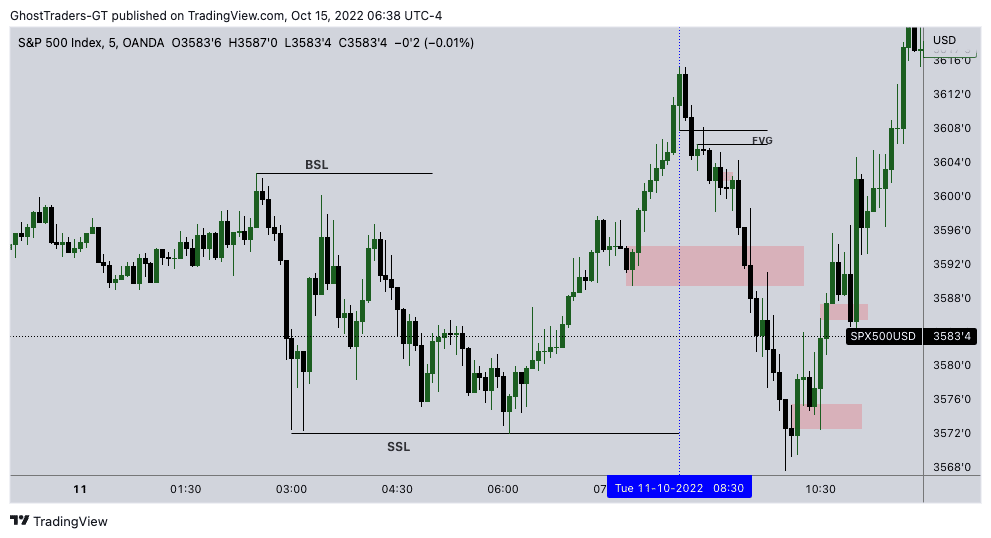
How To Trade Bearish Fair Value Gaps
When Price Collects buy-side Liquidity(BSL), we anticipate a reversal. wait for a shift in market structure to confirm the anticipated reversal. Once we have a shift in market structure, look for a fair value gap and use it as an entry point to sell short.

How To Trade Bullish Fair Value Gaps
When Price Collects Sell Side Liquidity(BSL), we anticipate a reversal. wait for a shift in market structure to confirm the anticipated reversal. Once we have a shift in market structure, look for a fair value gap and use it as an entry point to buy or enter a long position.
The institutional reference points for this trading model are fair value Gap, Shift in Market Structure, sell-side liquidity (SSL), and Buy-Side liquidity (BSL).
Hey, Check Our Instagram account and stay updated.

